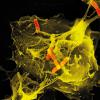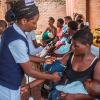Sarah May, Deputy Chief Executive of the IBMS, wonders at our apparent inability to celebrate success.

I have to confess that at the time of writing this editorial I am feeling uncharacteristically downbeat. Along with most of the UK population I have the social life of a hermit and my weekly thrill consists of a trip to the supermarket. Furthermore, London is a viral swamp with infection rates spiralling; no wonder I’m not my usual optimistic self, and my determination to clear the last of the Christmas chocolate in record time is simply making me feel toxic. Does anyone else share these feelings?
I am trying to curb my usual fanaticism for news bulletins as the relentless diet of bad news is simply not helping, and the sight of that dreadful carpet in the Number 10 COVID-19 briefing room makes me despair – you know the one I mean. Also, when the public needs clarity of message, I’m irritated by the inability of politicians to answer with a simple “yes” or “no”, which is why I am grateful for the scientists and doctors who now form part of a regular cohort of interviewees and who give honest, evidence-based opinions. Unfortunately, balanced responses don’t make for attention-grabbing headlines.
What I don’t understand is our apparent inability to celebrate success; our media channels seem to delight in finding the most negative aspect of everything and ignore the scraps of good news that occasionally emerge. Our vaccination programme is the most extensive in Europe. We have mobilised an army of individuals to administer vaccines to meet the ambitious coverage targets. This is amazing and shows just what we can achieve when people work together and it should be applauded at every opportunity.
Our rigorous safety standards should also be a cause for celebration and reassurance, not the subject of criticism for the delays this builds into the distribution programme; all vaccine batches are checked to ensure they are effective, structurally intact, and free of contaminants. Definitely time-consuming, but it’s reassuring that we do not compromise our safety standards.
Hopefully, by next month we will be starting to see a more positive future; hopefully the virus transmission rates will be falling and lockdown will have eased; hopefully the abuse that has been directed at members of hospital staff by rude, ignorant people will have ceased and professionalism will be recognised and respected. We can but hope.
Finally, on a lighter note, as I continue to settle in to dog ownership there is something I must share with you; my canine companion’s favourite toy is a squeaky, green rubber COVID-19 virus. Goodness knows what the neighbours must think when I’m calling “Hugo, where’s your virus? Go fetch your virus”.
Sarah May Deputy Chief Executive




